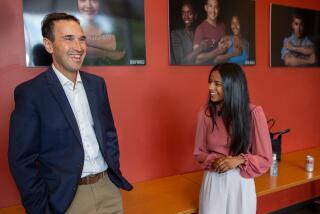CSUSM Reopens Wide Search for Business Dean
Cal State San Marcos has reopened its search for a dean of the College of Business Administration because of difficulty finding enough women and ethnic-minority candidates.
Advertisements in the Wall Street Journal first appeared last week as part of the extension of the university’s hunt for a business dean, said John Montanari, a Cal State San Marcos professor who led the search committee.
The university decided in July to reopen the search when only 43 people responded to the initial effort that began in January, said Montanari, who had hoped for “at least 100” applicants.
“The salary structure in the Cal State system is very constraining, and it is difficult to compete with schools that are also looking for those minority administrators and women candidates and who can pay from $25,000 to $75,000 more than we can,” Montanari said.
The fledgling university has had success in the past in recruiting women and minority faculty members, outpacing the rest of the Cal State system. Nearly half the faculty members are women and about one-third are from ethnic minorities. Systemwide, 28% of professors are women and 17% minority members.
Of the eight administrators at the dean level or higher at Cal State San Marcos, two are from ethnic minorities and one is a woman.
“It’s not a matter of finding qualified people. The issue is whether the diversity in the pool represents the diversity here in Southern California,” Montanari said.
“Certainly, we’re not targeting any particular group, but (it) is an objective of the university to attract more women and minorities (into) the pool. We’re obviously looking for the best candidate,” said Montanari, adding that the school “attracted some very good candidates” in the initial search.
The College of Business Administration includes nine full-time faculty and an acting dean, and business is the most popular major at the 1,200-student university, now in its second year.
As part of the extended search, the university has placed advertisements in the Affirmative Action Register and the Wall Street Journal, Montanari said.
“It truly is a challenge to find administrators because, in many cases at the university and college level, you find that administrators have very vocal and sometimes conflicting constituencies to deal with,” Montanari said.
Budget cuts have forced public universities to rely more on outside funds, an area that public institutions traditionally have not had to deal with, Montanari said.
“It puts administrators in a different role. Rather than being just managers, they are also fund-raisers, and that is a different position for a person who has worked their way up as a manager to be in,” Montanari said.
Allan Bailey, dean of the College of Business Administration at San Diego State University, agreed that the poor economic position of many universities has made the job of a college dean less attractive.
“Each year that I have been dean, I would say that the amount of energy put into (fund-raising) has increased every year,” said Bailey, who has been at SDSU for 14 years.
“There is more work with alumni and corporations, more work with people to get them to find particular parts of your program that they would like to fund individually,” Bailey said.
The extra duties have discouraged many faculty members who would ordinarily be attracted to dean positions, Bailey said.
Also, the percentage of qualified candidates for business deans who are minority members or women is smaller than for deans of other disciplines, adding pressure to schools that are looking for diversify, Bailey said.
More to Read
Sign up for Essential California
The most important California stories and recommendations in your inbox every morning.
You may occasionally receive promotional content from the Los Angeles Times.










